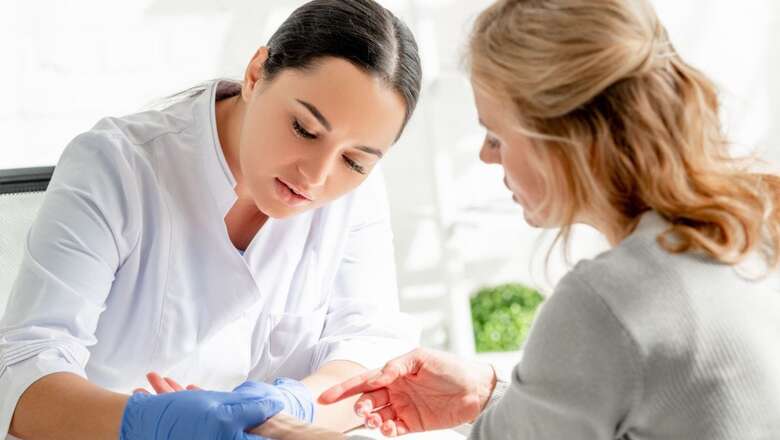
views
Regular skin exams play a crucial role in the early detection of skin diseases and can potentially save lives. Skin is our body’s largest organ and is susceptible to various conditions, including skin cancer. Early detection greatly improves the chances of successful treatment and reduces the risk of complications. Skin exams conducted by dermatologists can identify suspicious moles, lesions, or other abnormalities that may indicate skin cancer or other dermatological disorders. By prioritizing regular skin exams, individuals can take proactive steps towards maintaining their skin health and catching potential issues in their early stages when treatment options are more effective.
Dr Rashmi Aderao, M. D. Dermatology consultant, Ruby Hall Clinic, Pune, says, “Everyone can agree that prevention is preferable to therapy. We all spend time in front of mirror every day to groom ourselves, but we never observe for any changes. Examination of skin is very important aspect for early detection of various diseases. The skin is our body’s largest organ. Any internal changes happening in our body is also reflected on your skin, for example darkening of your neck can indicate for insulin resistance.”
Yellowish discolouration of skin and eyes in case of jaundice. Appearance of spots patches increasing in size shape of previous moles can be alarming. Appearance of bald patches may indicate autoimmune condition psychiatric conditions.
Importance of skin examination:
With increased awareness of skin health and increase incidences of skin related diseases, it’s imperative to visit a dermatologist for regular screening. Visiting a doctor not only helps to detect skin disease accurately but also prevent further spread of the disease.
“Skin diseases can be infective, allergic, autoimmune blistering diseases, psoriasis etc and at the end of spectrum there are skin malignancies. Infective skin problems like fungal infections manifest first as simple itchy rash and if not detected early then leads to spreading of the rashes to other body parts and to other people in the family. Mostly people neglect initial stage and treat it themselves by buying medicinal tubes from chemist which are mostly steroid based. This leads to increase in the disease process and treatment resistance. So, early detection is the key in infective skin disease,” says Dr Banani Choudhary, Consultant Dermatologist, H N Reliance Foundation Hospital and Research Centre, Mumbai.
Even for other skin problems like allergic rash, urticaria / hives, importance of early detection and treatment, cannot be stressed enough. All these diseases are in nature chronic and tend to be difficult to treat in later stage.
Simple solution for prevention is -self-examination of skin.
Dr Aderao shares simple steps to do self-examination
- In a mirror, check the front and rear of the full body, then the right and left sides while raising your arms.
- With the elbows bent, pay close attention to the hands, upper arms, especially the difficult-to-see back area, and both the outer and inner forearms.
- Examine the soles and the gaps between the toes on the front, sides, and back of the legs and feet.
- Part the hair to lift it, then use a hand mirror to check the scalp and back of the neck.
- Use a hand mirror to check your buttocks, back and genitalia.
- Take pictures of the lesion(s) to document any changes over time if you notice that particular skin-related areas are changing.
Early detection can save lives. Regular self-examination of skin gives you the power to detect any disease early when it’s easiest to cure, before it can become deadly.
Dr Choudhary adds, “Preventive aspect of skin disease also lies in the fact that some diseases if we can find the triggers like sun allergy, or allergy to pollens / food etc. can be treated permanently. Early detection of skin cancer like Melanoma or squamous / basal cell carcinoma can be lifesaving. In the early stage, skin cancers can be very innocuous like a small red dot or a black pigment. So, any change of mole, like redness or bleeding or increase in size can be suspicious and immediate attention of dermatologist is needed. Any appearance of new skin lesions on any parts of body including oral cavity / inside mouth area or change of normal structure of skin like redness / itching / pain / boils / blisters needs a dermatologist’s advice and treatment accordingly.”



















Comments
0 comment